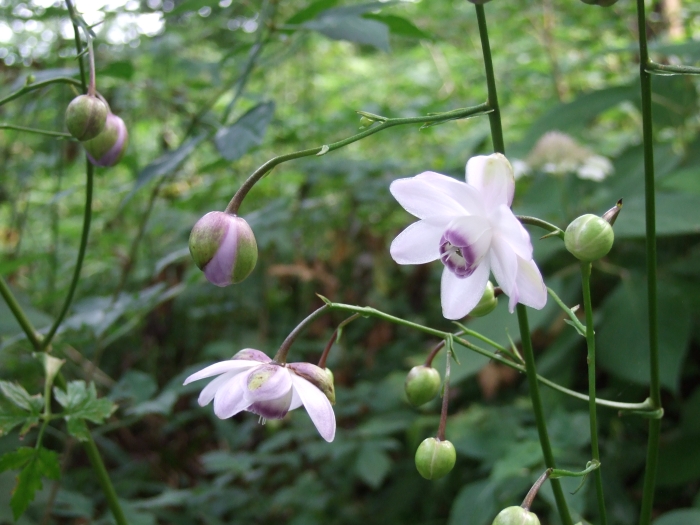False Anemone
(Anemonopsis macrophylla)
False Anemone (Anemonopsis macrophylla)
/
/

Haragayato
CC BY-SA 3.0
Image By:
Haragayato
Recorded By:
Copyright:
CC BY-SA 3.0
Copyright Notice:
Photo by: Haragayato | License Type: CC BY-SA 3.0 | License URL: https://creativecommons.org/licenses/by-sa/3.0 | Uploader: Haragayato | Publisher: Wikimedia Commons | Title: Anemonopsis_macrophylla.JPG | Notes: Uploaded own work with UploadWizard |




























Estimated Native Range
Summary
Anemonopsis macrophylla, commonly known as False Anemone, is a herbaceous perennial that is native to the cool, moist woodlands of Japan. It typically grows to about 75 cm in height and is known for its unique pale lavender flowers that bloom in late summer. The flowers, about 2 cm in diameter, are bowl-shaped with a central rosette of petals and are downward facing, giving the plant an appearance of daintiness and airiness. When in full bloom, the flowers bear a resemblance to small lotuses and are held well above the foliage. The plant’s leaves are large and contribute to its lush appearance.
False Anemone is valued for its delicate floral display and is often used in shaded garden settings, such as woodland gardens and shaded borders. It requires summer moisture and well-drained soil, particularly in winter to avoid root rot. The plant thrives in part shade to full shade and needs protection from drying winds and direct sunlight, which can scorch its leaves. It is more successfully cultivated in the continental climate of the eastern United States and Canada than in the Mediterranean climate of the Pacific Northwest due to its moisture requirements. While it is not a small plant, its overall impression is one of elegance and lightness, making it a charming addition to gardens that can provide the cool, moist conditions it prefers.CC BY-SA 4.0
False Anemone is valued for its delicate floral display and is often used in shaded garden settings, such as woodland gardens and shaded borders. It requires summer moisture and well-drained soil, particularly in winter to avoid root rot. The plant thrives in part shade to full shade and needs protection from drying winds and direct sunlight, which can scorch its leaves. It is more successfully cultivated in the continental climate of the eastern United States and Canada than in the Mediterranean climate of the Pacific Northwest due to its moisture requirements. While it is not a small plant, its overall impression is one of elegance and lightness, making it a charming addition to gardens that can provide the cool, moist conditions it prefers.CC BY-SA 4.0
Plant Description
- Plant Type: Herb
- Height: 2-3 feet
- Width: 1-1.5 feet
- Growth Rate: Moderate
- Flower Color: Purple, Pink
- Flowering Season: Summer
- Leaf Retention: Deciduous
Growth Requirements
- Sun: Part Shade
- Water: High
- Drainage: Medium, Fast
Common Uses
Deer Resistant
Natural Habitat
Cool, moist woodlands of Japan
Other Names
Common Names:
Scientific Names: , Anemonopsis macrophylla, Actaea macrophylla, Xaveria macrophylla,
GBIF Accepted Name: Anemonopsis macrophylla Siebold & Zucc.